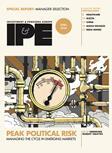The prudent person principle, ‘PPP’, has been incorporated into the proposal for a European Pension Fund Directive, because it contains statements of principles which support the most efficient management of funding assets for long-term pension liabilities. Adherence to the PPP by pension fund trustees, asset managers and pension consultants, is in the interest of pension plan participants and of shareholders of sponsoring firms, because it ultimately reduces the financing costs of pension plans.
Accounting rules such as IAS or US GAAP, have been established and continuously refined in order to create transparency and to allow a true and fair view of a company’s financial situation. Such rules aim to serve the interests of shareholders and other stakeholders as well.
There is currently a risk that rapid developments in new accounting rules in the EU and its member states may lead to an accounting environment which is inconsistent with the PPP. It is in the interest of the asset management industry and its clients that potential conflicts between the PPP and accounting rules are harmonised in a reasonable manner. The author of this article aims to initiate, or contribute to, a respective discussion by illustrating this phenomenon from the perspective of an asset manager.
Asset managers offer services to their clients at the following three levels: (1) formulation of investment strategy, (2) implementation of investement strategy in specific portfolio management mandates, and (3) optimisation of the client’s accounting, tax, and administrative position through investment vehicles and other appropriate concepts and solutions. The importance of level (3) for level (1) has been highlighted by a recent, well-publicised announcement of Boots, a UK company. Boots moved its pension fund asset allocation to 100% bonds as a reaction to FRS 17, the new UK pension accounting standard. In essence, FRS 17 means that equity market and interest rate changes have a much more direct impact on company accounts (balance sheet and income statement) than under existing UK standards or even under IAS or US GAAPor IAS. The underlying rationale of FRS 17 is to make the impact of a (DB) defined benefit pension plan on a company’s economic situation more transparent than at present. As a consequence, pension fund trustees will have to discuss strategic and tactical asset allocation much more closely with the company’s treasury department than under the old rules. While these may be welcome effects, there is a clear risk that the management of funding assets for long-term pension liabilities could be inappropriately influenced by short-term considerations related to the company’s income statements.
The PPP, as embodied in the proposal for a European pension fund directive, could be adversely affected by such a development on the accounting front. According to Article 18 of the proposal, pension fund assets are to be invested in a prudent manner, “appropriate to the nature and duration of the expected future retirement benefits”. Quite frequently, the current duration of future payments of a DB plan in the UK or Germany is 15 years or longer. If one assumes that well-diversified risk assets (equities) will outperform bonds at least in the long-term, a prudent and appropriate investment strategy in the sense of Article 18 of the proposal would include a significant equity portion. In such volatile markets as one has seen in the past two years, the equity exposure would almost certainly have caused a temporary underfunding of a pension fund. Article 16 of the proposal, “funding of technical provisions”, uses a quite sensible approach to this problem. The proposal, as adopted by the European Commission, provides that member states shall require pension funds to have sufficient assets to cover the technical provisions “at all times”. However, it also provides that member states may allow pension funds – only for a limited period and under certain specified conditions – to depart from the fully funding requirement. It is also interesting to note that the European Parliament amended Article 16 to provide that member states shall require every institution to have, on average, calculated over a period of one year, sufficient and appropriate assets to cover the technical provisions at all times. Under FRS 17 such discretion would not exist, ie, the market volatility would directly impact the sponsor company’s income statement. The above-mentioned example of Boots shows that respective short-term accounting risks may lead to a different, probably less efficient investment strategy (100% bonds).
The potentially damaging effects of inflexible accounting rules have also been revealed in the German capital market after September 11, last year. German life insurers, as a rule, have been required under section 341b of the German Commercial Code (HGB) to write-down holdings in securities (such as equities and bonds) to their respective market values. The extremely low market levels after September 11 caused a serious threat to the German equity markets. There was a real risk that a number of German life insurers might reach a point where their technical provisions could no longer be considered as fully funded. In letters sent to a number of German insurers before September 11, the insurance supervisory office had made it clear that life insurers would not be allowed to hold volatile assets (equities) if further market down-swings might lead to an underfunding of the insurers’ technical provisions. In an already disastrous equity market situation, a forced selling by German life insurers – one of the most important investor groups – would likely have initiated a further dangerous downward-circle in the German equity market.
In a well-orchestrated effort, the German insurance industry managed to persuade their supervisory office and the legislature that, in difficult market situations, the mandatory write-down requirement of section 341b HGB can lead to unreasonable results, with damaging effects on the insured and on the capital markets. As a consequence, the accounting rule was changed before year end 2001 (the relevant accounting date for most German life insurers). Under the new rule, equities, investment fund units and bonds which serve a long-term funding purpose must only be written-down to a market value below cost if the decrease in market value is likely to be of a permanent nature. This aproach corresponds with the rule applicable to other companies including banks. It is also fully in line with the approach used by the proposal for a European pension fund directive.
Ironically, at the very moment when the German legislature explicitly recognises a practical need for adding some flexibility to accounting rules relevant for to the prudent management of life insurers’ funding assets, there are countervailing trends in the accounting environment for German companies. Those trends which lead to a more rigid, less favourable accounting framework for the management of funding assets for long-term liabilities. The most important example for such liabilities are pension book reserves. The balance sheets of German companies currently show book reserves with a total book value of about E200bn.
According to a recent study, about 50% of these book reserves are backed by ‘ear-marked’ securities, mostly German special funds (Spezialfonds) held within the companies’ balance sheets (internal funding). Special funds are investment vehicles for equity and bond portfolios. German special funds currently have a total market value of about E500bn. The success of special funds with German institutional investors, including tax-exempt investors such as Pensionskassen, foundations, and charities, (German special funds currently have a total market value of about E500bn) is to a large extent related to their accounting treatment. Under German commercial accounting rules (HGB), investors show the special fund units, not the underlying securities, in their balance sheets. Since the special fund units have to be shown at cost – with a write-off only in the case of a permanently lower market value, see above – investors could gradually build up undisclosed book reserves. Normally, such reserves were used by German institutional investors to increase – ideally in line with the prudent person principle – their allocation to riskier assets such as equities or long-term bonds without increasing the risks for the balance sheet or income statement. Until recently, IAS and US GAAP accounting rules (which apply to a growing number of German companies) did not contravene this sensible approach. While undisclosed book reserves were no longer possible because under IAS and US GAAP the special fund units had to be shown at market prices (‘securities available for sale’), price volatility in special fund units had no direct effect on the company’s income statement.
At the end of 2000, the standard setting body of the German accounting profession came to the conclusion that special funds should be disregarded as an intermediate entity and looked through for IAS and US GAAP accounting purposes. Similar ideas are currentlycurently under discussioned with regard to to HGB accounting. As a result thereof, the the special fund’s underlying securities (– equities, bonds, etc.) – are shown in the investor’s balance sheet, and each transaction initiated by the manager of a portfolio (whether – active or index-tracking) – portfolio manager has a direct impact on the investor’s income statement. It is not surprising in such an accounting environment that towards the end of 2001, some institutional clients asked their asset managers to avoid portfolio shifts if the envisaged transaction would have caused the realisation of a loss. In this example, the accounting environment even produced effects on day-to-day portfolio management decisions.
A more favourable accounting regime applies to those German companies which have externally funded their pension liabilities by means of so-called contractual trust arrangements (CTAs). So-called “corridor accounting” (compare US GAAP, FAS 87) allows the company to minimise risks for the balance sheet and income statement as a result of asset price volatility. The example of corridor accounting shows that the standard setting bodies for US GAAP have recognised the practical need for a more flexible accounting regime for pension funding assets.
These examples make it quite obvious that a fast-changing accounting environment at both the European and the member state levels should not only warm the hearts of accountants and actuaries, but should also be given primary attention by the asset management industry and its clients.
Accounting rules may have positive effects by improving transparency for shareholders, but, at the same time complicate the provision of asset management services. As a consequence, unreasonable accounting rules can increase the funding costs of long-term liabilities such as corporate pension liabilities, and ultimately reduce the return for shareholders. It is important that the practical implications and the potential costs of changes to accounting rules in general, or to pension fund accounting rules in particular, be better understood by policy makers. It is also suggested that accounting rules should provide transparency, but should not prejudice decisions which really ‘belong’ to a company’s management and its shareholders.
Shareholders may prefer the funding strategy chosen by Boots in the above example (100 % bonds), or a more traditional approach with a significant equity exposure. It should be left to the market to decide which approach promises to be more efficient.
Klaus Mössle is managing director, Deutsche Asset Management, in Frankfurt and president of the European Asset Management Association (EAMA)












No comments yet